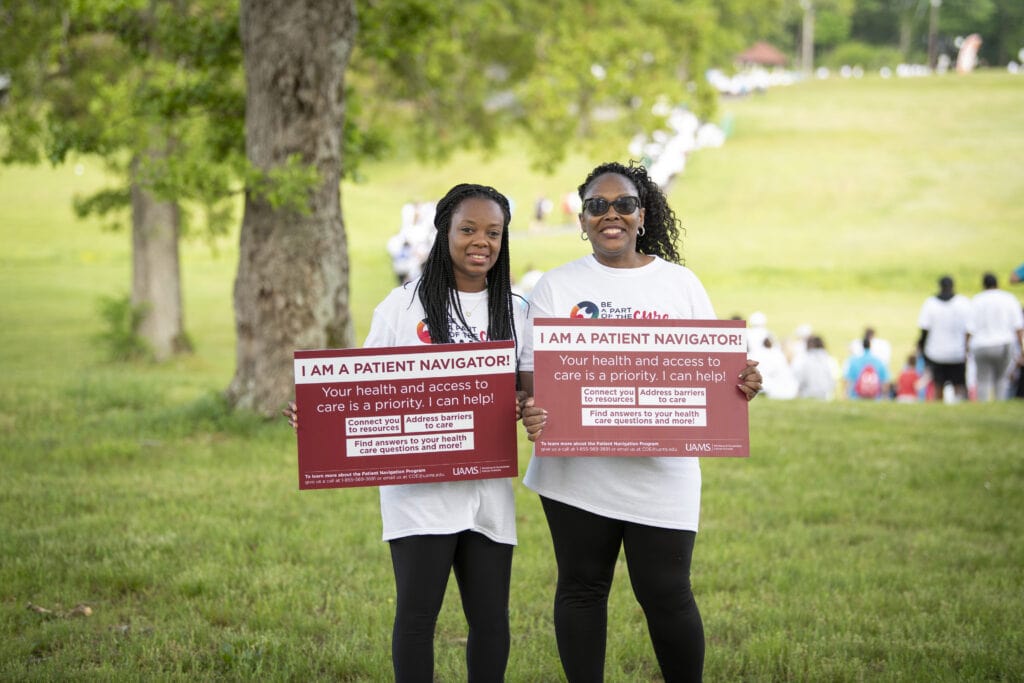
Cancer Navigators Lift Underserved Communities and Patients in Need
Robin Thrower and Carline Massey, two of the UAMS Winthrop P. Rockefeller Cancer Institute’s first cancer navigators, didn’t have to look far or long to find patients in their communities in need of help. Part of a growing Cancer Navigation Team in the Institute’s Community Outreach and Engagement Office (COE), they are busy making sure people with a cancer diagnosis
in the state’s most rural, underserved communities have access to the treatment and support they need.
“We know that advances in cancer treatment may not reach underserved communities, especially in low socioeconomic areas and racial and ethnic minorities,” said COE associate director Pearl McElfish, Ph.D. “Cancer navigation is a necessary intervention to improve access to cancer care.”
For Cancer Institute Director Michael Birrer, M.D., Ph.D., cancer navigation is a moral imperative. “Arkansans deserve equal access to state-of-the-art cancer screening regardless of economic or geographic differences. Every Arkansan should have access to the best possible treatment and lifesaving clinical trials,” he said.
Addressing the health disparities in the state’s rural areas where cancer rates are higher is a key focus of the navigation program.
In Miller County, Massey works with many people who don’t have access to the cancer treatment or resources they need. “It’s hard to take care of your health when you can’t afford to drive to doctor’s appointments,”
said Massey, who often deals with transportation and malnutrition as significant barriers to any type of health care, especially cancer screening and more specialized treatment. But Massey and her counterparts across the state are helping patients address those barriers.
“It’s an honor to be one of the first cancer navigators,” said Carline Massey, who works with patients in Miller County, including Texarkana, and across southwest Arkansas. “It’s a new concept for our communities, but when I introduce myself as a cancer navigator from the Winthrop P. Rockefeller Cancer Institute, the response is so positive.”
The overall cancer burden in Arkansas is higher than the national average. In 2018, the state reported an incidence rate for all types of cancer in all stages of 486.4 compared to 435.8 in the U.S. Cancer death rates in the state are nearly 20% higher than the national average. The cancer incidence in rural and areas of the state is even more acute.
As the institute rolls out cancer navigation across the state, the navigators themselves are learning and adapting to the new roles as they go. Massey and Thrower are finding the “how” of being cancer navigators involves a little bit of everything – “scheduling appointments, arranging transportation, literally whatever it takes,” said Thrower.
“I help cancer patients with anything that will keep them from being able to access their care,” said Massey. It sounds simple but requires a broad range of skills and competencies.
UAMS cancer navigators serve all cancer patients, whether they are UAMS patients or not. “We will work with any local provider,” said Massey. “Our goal is to make sure patients are cared for, period.”
Thrower got her unofficial start in patient navigation when her grandfather was diagnosed with prostate cancer.
She was in high school at the time but became her grandfather’s advocate, doing everything from coordinating appointments to providing emotional support to her grandmother.
“I know what it’s like to get the news that a relative has cancer,” said Thrower. “From that first shock and then thinking about how to handle it. I’ve always been compassionate, but now I’m looking at it the same way they do. I try to help them understand that cancer is not a death sentence,” she said.
So far, no day is the same for Thrower, who works in Magnolia. One day, she is coordinating transportation for a patient, the next she’s helping a patient deal with food insecurity or insurance benefits.
“Insurance doesn’t cover transportation in certain parts of Arkansas, so that’s a common barrier for many patients,” she said. Thrower finds neighbors or churches with vans who are willing to help, or she gets in the car and goes with them to the doctor.
“I worked with a patient who was living alone on a small monthly benefit and knew they had cancer but didn’t have transportation to get to an oncologist.” Navigator’s document everything in a patient resource plan.
In an area of the state where health care providers are in short supply, navigators also interact directly with clinicians to help patients coordinate treatment. Thrower spends the extra time to sit and speak to patients that most doctors and nurses simply don’t have.
“It’s such a relief when I tell patients that we’re there for them, whatever they need,” she said. It’s knowing that you have that support, letting them know we’re going to take this one step at a time. I tell my patients to call me if they need me, and there are no silly questions.”
Navigation services are available to all Arkansas cancer patients, regardless of provider. No referral is necessary. To learn more, call 1-855-569-3691 or COE@uams.edu.
Community Outreach and Engagement Office Advisory Board
Thomas Bailey, M.D.
Helena-West Helena
Elizabeth Flippo
Texarkana
Stacey Gross
Batesville
Debra Hinkle
Pine Bluff
Josephine Jackson
Pine Bluff
Shaletha Jones
Magnolia
Santrice Kearney
Pine Bluff
Morgan Ludwick
Fayetteville
Alma Rattler
Helena-West Helena
Kenneth N. Reid Sr.
Texarkana
Lisa Rodriquez
Batesville
Robin Thrower
Magnolia
Lafayette Woods
Pine Bluff
